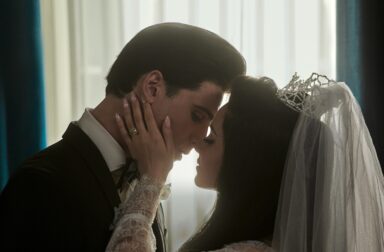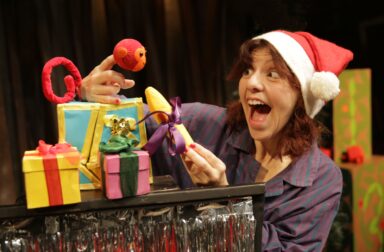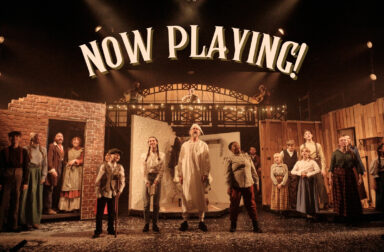
by Avril Silk | Remote Goat Review
If your ex-lover publicly denounces you as ‘mad, bad and dangerous to know’ you soon become accustomed to getting away with being outrageous and people hanging on your every pearl-like word, whether provocative, profane or poetic.
My flippant, unspoken reply to Paul Huntley-Thomas’s wonderfully realised, handsome, languid Lord Byron was, ‘I came for the frockcoat in the poster and more than just the headlines and the hits.’ I didn’t get the frockcoat and he deliberately slaughtered one of the hits but we were given an all-too-brief glimpse of the stories, scandals and secrets behind the headlines.

Byron’s glittering charm was laced with grief at the early death of Edleston; a grief that intensified when he talked of the death of his daughter Allegra, aged five. Paul Huntley-Thomas’s range is remarkable, and his reading of ‘Darkness’ was among the best I have ever heard – perfect phrasing and crystal clarity, plus a blessed absence of histrionics and affectation.
I was fascinated to hear of Byron’s passion for social reform; he was one of the few Parliamentary defenders of the Luddites: specifically, he was against a death penalty for Luddite “frame breakers” in Nottinghamshire, who destroyed textile machines that were putting them out of work. On a day when people from all over the world were travelling to vote for or against repeal of the Eighth Amendment, it was interesting to hear of Byron’s support for Catholic Emancipation, enabling Roman Catholics in Britain to participate fully in public life.
It seemed easier for our Romantic (!) hero to acknowledge incest and debauchery than to dwell on his goodness. The script lightly touched on his support for the Greek war of Independence (delicately alluding to current concerns) but could well have emphasised his humanitarian work, using his great wealth, to help the victims of the war, both Muslim and Christian. The play inspired me to further research: Byron spent £4,000 of his own money to refit the Greek fleet; he adopted a nine year old Turkish Muslim girl called Hato, echoing a strand in his epic poem ‘Don Juan’, whose eponymous hero joins the Russian army, and rescues a Muslim girl named Leila. Even now, Greeks revere Lord Byron as a national hero, although his aid did not significantly affect the outcome of the war. His anger at the removal of the Parthenon marbles increased his heroic standing in Greece.
It is always good to leave your audience wanting more (and inspiring them to further exploration.) It’s a fine line though, with ‘not enough’ being a risk. ‘Mad, Bad and Dangerous to Know’ is the perfect length for the Edinburgh Fringe, but I wish we could have seen an extended version at Taunton’s Brewhouse Theatre. The intensity of a one-man performance is a factor; intervals can spoil the flow; but with such a wealth of material left unexplored, this is a problem worth grappling with. Or do modern audiences lack the stamina for longer performances? After-show responses would suggest not.
What would I wish to have seen included? My training leads me to ask about this damaged, destructive, brilliant man’s childhood. Byron’s vicious, heiress-hunting father; his by turns indulgent and vexing mother; his passionate love, aged eight, for his cousin Mary; his sexually abusive nursemaid are all worthy of mention..
We established his love of dogs as Paul Huntley-Thomas wooed the audience with banter and chat; only later did I learn that his beloved Boatswain contracted rabies, and Byron nursed him without any fear of becoming bitten and infected. And what of Ada Lovelace, his only legitimate child, regarded as the first computer programmer, and according to Byron, ‘sole daughter of my house and heart’
Paul Huntley -Thomas reminded me of David Bowie; had Byron lived long enough to leave the decadent days behind him as Bowie did; had he met his match, his Iman, he might have been remembered differently.
In conclusion, a terrific performance of a fascinating play.
More, please. Much, much more.
★★★★






